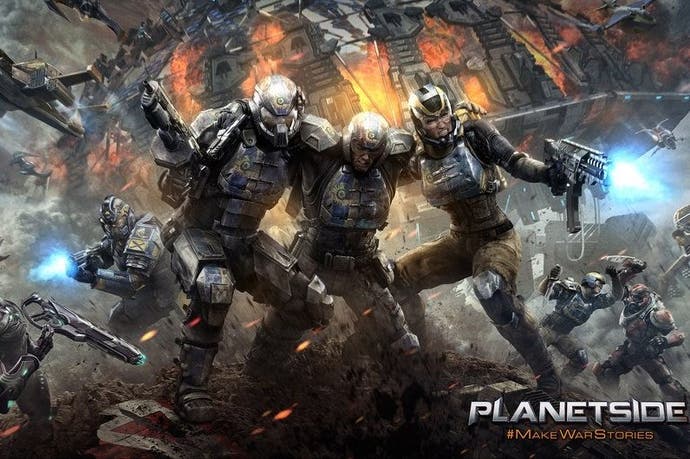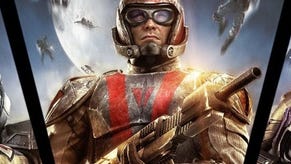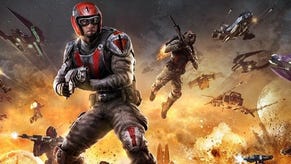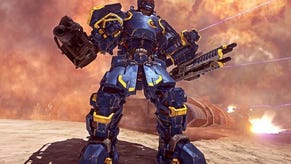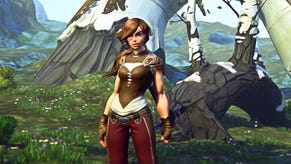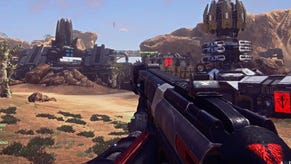PlanetSide 2 review
The few. The proud.
PlanetSide 2 may well be the greatest war game ever. Not because it has slick mechanics, memorable technology or even innovative ideas, but because it understands and portrays war in a way that few other games have managed.
A free to play first-person shooter, set on an open and persistent online sandbox world, it plunges you into an ongoing conflict between three rival factions in a way that truly makes you understand what it means to be a single soldier in a vast war. This is the first-person shooter as a sausage machine, and you're the meat.
As detailed in last week's first impressions piece, PlanetSide 2 is also a game that makes very little effort to explain itself to new players. It is very different to most shooters in important ways, but it's up to you to work these differences out for yourself through brutal, punishing experience. It's a failure of game design that becomes, in a weird way, the game's stroke of genius. You feel the confusion and terror of a raw recruit, frozen by the sheer scale of the war around you, in a way that simply wouldn't happen if the game gave you a hand-holding tutorial and eased you in.
The irony is that the game does ease you in, or at least pretends to, with the new introductory area of Koltyr. It's less of a boot camp and more of a crucible however, where you can be forged into a Level 15 warrior equipped to survive in the larger battle waging elsewhere.
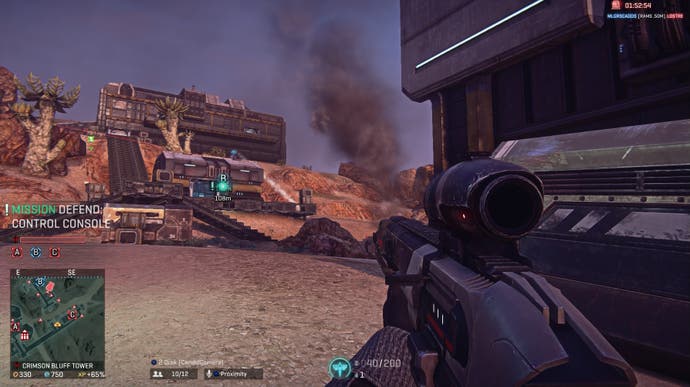
With hundreds - potentially thousands - of other players all sharing the same world, the challenge PlanetSide 2 faces is the same as that faced by any MMO title: how to get people playing properly without slowing things down to constantly explain. On PC, where Planetside 2 and so many other online games debuted, that's an easier task. There's an FAQ culture in PC gaming that hasn't translated to console, and the ability to tab out of the game to check a video or forum for explanations is an acceptable option.
You can't really do that on the PlayStation 4, and given the game's surface similarities to more traditional shooters it is both understandable and inevitable that large swathes of the player base seem to be struggling to treat the game as anything other than an ordinary shooter.
Here's how PlanetSide 2 works. You'll be directed to the nearest location where the action is kicking off. These are generally facilities of some kind, with familiar alphabetised capture points. Depending on the circumstances of the battle, and the faction ownership of the facility, you may be required to take or defend these points. Sometimes shield generators must be taken down in order to allow troops to invade deeper into the location, or control points must be seized to limit the enemy's ability to spawn into the area.
The rhythms and structure are similar enough to the likes of Battlefield that you're unlikely to be too confused at this point. The mission will change on the fly, however, and it's entirely possible to find yourself engaging in a completely different battle or being left behind if you don't keep tabs on where you're supposed to be. Sometimes the auto-respawn will drop you back at your faction's HQ, and if you've not been keeping track of the ebb and flow of the war, you won't know why.
Even once you've mastered the art of checking your orders to ensure you're doing the right thing, PlanetSide 2 has a pace of its own that requires your attention. Unlike superficially similar games, it's not enough to just dash into a capture point, earn the XP for turning it, then dash off to the next one. This isn't a game with that sort of action churn. You'll earn more XP, and prove more useful to the battle, by not only capturing key map points but holding and defending them - often for five minutes or more - than for sprinting off in search of the next headshot.
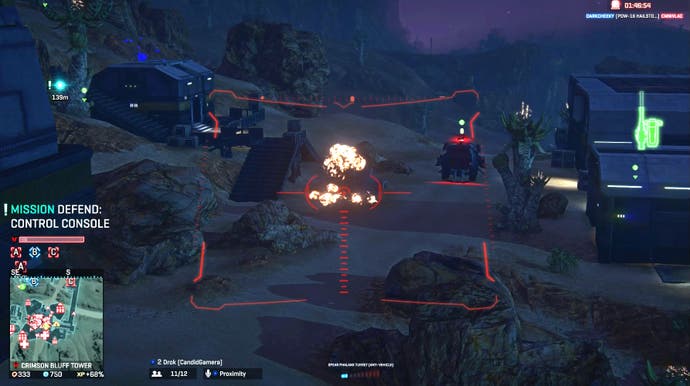
It's this more realistic form of combat that gives PlanetSide 2 its depth. The importance of understanding the strategic value of a target, and of committing to a coordinated approach that values long-term gains over short-term thrills. Too often, PS4 players seem to be spending their time looking for enemies to shoot rather than positions to fortify. Players will spawn the game's Sunderer troop transports, and then immediately drive off with no passengers, ditching the vehicle once they find a firefight to get stuck into. The Sunderer is so much more than a bus - it's a mobile spawn point that is key to every incursion, but it must be carefully positioned and then deployed in order to function as intended. The game doesn't explain this, and too many players don't seem to work it out.
It's a game that suffers for its unhelpful nature, and a certain proportion of fairweather players attracted by its free-to-play status, but when the stars align and you find yourself in amongst others who know what they're doing, the result is astonishing. Rolling up on an objective with dozens of other ground troops, mech suits, tanks and air support is a thrill that never loses its lustre. Fighting off enemies with a handful of players and seeing a swarm of friendly icons heading your way on the minimap, you get a sense of relief and camaraderie that no other console shooter offers.
It's here that PlanetSide 2 is at its best, where it truly makes you feel part of an army - small and insignificant by yourself, but supported by forces on a scale that puts even Battlefield 4's 64 player lobbies in the shade. There's a delicious friction between the knowledge that you are a tiny element of an enormous system, free to wander off at any time with no map boundaries to hold you in or match countdowns to kick you out, and the fact that you share that status with hundreds of others. As such, the moments of brilliance, where tactics and cooperation emerge naturally in organic, spontaneous scenarios, you're experiencing war stories the likes of which haven't been seen in console multiplayer before.
Sadly, the moments when PlanetSide 2 is at its most exciting in terms of gameplay are often the same moments when it is at its weakest in technical terms. The frame rate struggles to cope with the large player numbers which showcase the game at its best, and in a genre where instant feedback and accuracy are still the benchmark that can't help but hamper its appeal. Characters flick in and out of existence, textures and objects can be slow to load in and close quarters encounters with multiple players dissolve into a laggy polygon soup all too easily.
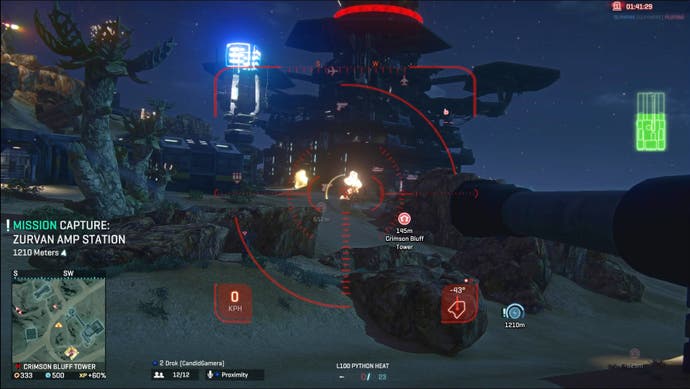
There are also some balancing issues due to the way the game handles factions. In a normal shooter, the game can put switch players from one team to another in order to balance a lobby. In PlanetSide, the faction you chose for your character is the faction you're stuck with, so when one faction has less players online there's not much the game can do to compensate. All you can do is use the game's generous spawning options to find an area where the numbers are more or less even. Still, you will have times where you're outnumbered with no hope of rescue.
Such are the pitfalls of ambitious multiplayer gaming, of course, and PlanetSide fares better when tackling other aspects of modern online play. This is a game that does free-to-play correctly, offering paid boosts in premium Battle Cash currency for players who want to level up faster and the option to buy new weapons immediately along with decals and other cosmetic features. Thanks to PlanetSide's broader design, these short cuts can benefit the individual player without unbalancing the whole.
Weapons can be purchased using in-game currency, and the prices are not vastly different to those in Battle Cash. There's no grind to get better kit, in other words. Not that better kit makes you an instant killing machine. The game's open-ended borderless war doesn't really lend itself to overpowered characters, since anybody and everybody can be brought down from some angle. It's more about finding the weapons that work best for you, tailoring your loadout to the way you prefer to play, than leapfrogging up some ladder of escalating hardware to get access to gear that makes skill irrelevant.
I keep coming back to this question of scale, and it's why I feel PlanetSide 2 may be the one of the greatest war games, because it's a game that really feels like war. It doesn't cast you as a super soldier, just a soldier, and it isn't afraid to leave you feeling lost and alone. Nor does it protect you from things that years of FPS dogma have taught us to consider unfair.
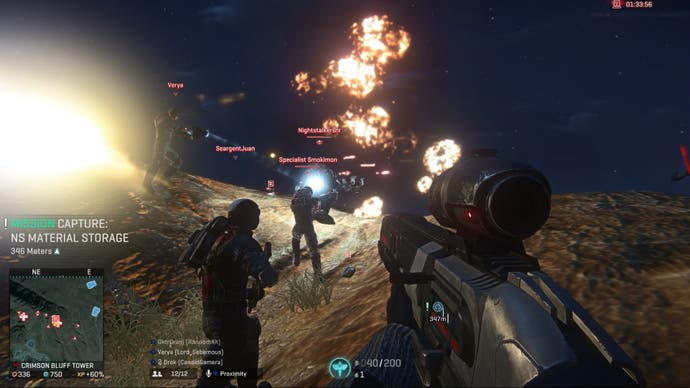
You will die, often, without ever seeing your attacker. You will die instantly if you spawn at a Sunderer which is under attack. You'll die when a friendly tank crushes you. And you will keep on dying, until you teach yourself how to survive - and eventually thrive - in a warzone with no boundaries. Even then, you never stop feeling small and vulnerable. You never stop questioning the wisdom behind throwing yourself again and again at a fortified position, or pondering the futility of a victory that may have been reversed by tomorrow morning.
It would be facile to say a game about endlessly spawning space armies provides meaningful insight into what men experienced in the trenches a century ago, or on the beaches of Normandy, but it offers a hint. For every moment of elation or excitement, this is a game that can also be exhausting and horrifying. Unlike other shooters, which more readily dress their bombast in patriotic colours and pay lip service to real world conflict, in amongst the jetpacks and plasma turrets, PlanetSide 2 actually has something to say about the impersonal cruelty of war. The commentary may be abstract but it's there.
All of which makes PlanetSide 2 a real outlier at a time when major console releases are either utterly broken or blandly efficient. This is a game with some fairly major problems, but the rewards are so unique, so thrilling and occasionally thought provoking that even dropped frames, obtuse direction and dumb players can't diminish it for long. This is a game that will not appeal to everyone. Many will fall by the wayside when it fails to play like a normal FPS in the long term. Others will drift away, wearied by the endless churn of battle. That's why the game's free-to-play status is a good thing - those players will have lost nothing for their trouble. For those who click with PlanetSide's cold relentless vision of mass warfare, it can easily become an ongoing obsession. The only way to find out is to sign up and see for yourself.
